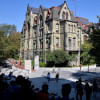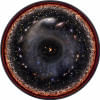Life as a Researcher at MIT and Princeton

Around the start of my second undergrad year, I read the United Nations Climate Change Annual Report 2019. I was aware of the usual stuff: the temperature had been increasing, and that more carbon was being released amongst other things. I kept reading, and my eyes landed on the sentence "Continued sea-level rise is irreversible over hundreds to thousands of years … only 11 years left to prevent irreversible damage from climate change." I felt a sense of dread slowly resurfacing. Bangladesh was third on the list of countries that would drown due to sea-level rise.
Climate change has always seemed like a distant, scary event. It's not something we need to work on within a 10-year time frame. For the next few weeks, I felt restless and conflicted. Since middle school, I have been in love with Physics and differential equations, and how they govern our universe. It is breathtakingly beautiful and the purest way to look at the universe, but are beauty and purity enough in this fight against climate change and the energy crisis?
I then had a conversation with Samuel Cohen, Director of Princeton Plasma Physics Laboratory (PPPL). Through our conversation, I learned that nuclear fusion energy, if successful, would make coal and oil-based non-renewable energy sources obsolete and help us effectively fight climate change. It would also give us a clean, nearly inexhaustible source of power. So, it turned out that the beauty and purity of Physics are indeed helpful. I then joined Samuel's project the following summer.
The research experience was foundational in my growth as a person and researcher. After working at PPPL, I explored other areas of Physics under the supervision of Prof. Zahid Hasan and Prof. Howard Stone, and fell in love with research and problem-solving even more. I finally graduated in 2023, getting a major in Physics and a minor in Computer Science. The word "Princeton alumni" carries an unmatched legacy and prestige. However, I was not interested in industry, so I was not keen on using that alumni network. I was still in love with Physics, as I was ten years ago, and I decided to join the Massachusetts Institute of Technology (MIT) to pursue a PhD in Physics in 2023.
I started my research under Paul Bonoli in the Plasma Science and Fusion Center (PSFC), a laboratory at MIT known for various historical breakthroughs in nuclear fusion in recent years. The overall atmosphere at MIT was very different from that at Princeton, which I missed from time to time. I was also initially worried about some stories I'd heard about how lonely life as a PhD candidate can get, which scared me. Was I ready to give up most of my early youth to pursue my passion? Fortunately, one thing MIT had going for it was its sheer energy. Boston is a city full of life, which perhaps infected MIT as well.
My PhD research so far has involved simulating nuclear fusion and working on equations on pen and paper. It is similar in spirit to the work I did before starting my PhD but with a noticeable difference: the stakes are much higher. MIT is dead set on making magnetic fusion work soon. As exciting as that prospect may seem, it is also anxiety-inducing.
MIT's Plasma Science and Fusion Center (PSFC) lab, in particular, is full of scientists ready to change the world's fate and experiment with very innovative ideas. The bustling social life, various social movements, and the "can-do" attitude are infectious, and I realised that I would have fun here, even outside of the fun of playing with Physics. The environment at PSFC is similar to that of a startup, which makes sense given that it founded the most promising fusion startup yet, Commonwealth Fusion System.
Something that often stands out is how casually people here propose cutting-edge methods as if they are working on a high school science fair. Initially, I was perplexed about how they remained so calm, almost like they were having more fun because of the stakes. Nowadays, I think Feynman was correct about the motivation for research. Sure, Physics is essential and gives us predictive power over nature, but that is not why people here are doing it. They are having fun.

 For all latest news, follow The Daily Star's Google News channel.
For all latest news, follow The Daily Star's Google News channel. 








Comments